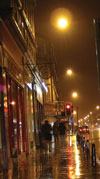

Hoteliers must implement a comprehensive security system, to ensure that all activity in the building can be closely monitored at all times and to ensure their overnight workers and night security staff are protected.
Hotels are one of the few buildings that can be entered without restriction and therefore hospitality managers need to be able to maintain vigilance around the clock to prevent crime. On a daily basis, hoteliers have to face-up to the threat of theft and attacks on employees and security staff, so it is worth taking the time to consider the security options available.
It is not only necessary for hoteliers to implement a comprehensive security system, to ensure that all activity in the building can be closely monitored at all times, but also to accept responsibility for protecting their overnight workers and night security staff. Working during the night, these members of staff are potentially the most vulnerable, as cover of darkness can present more opportunity for crime.
In order to protect night staff from harm, a range of security systems should be considered as part of the overall solution. With this in mind, experts from ADI Global Distribution provide advice on the latest physical crime prevention methods available, as well as staff involvement and designing out opportunities for crime.
CCTV
“For any hotel aiming to protect its night staff, it is essential that a good CCTV system is installed from the outset, to enable 24 hour monitoring of activity around the building,” comments Ernest Mallett, product manager at ADI Global Distribution. “When installing CCTV and designing out risk in a hotel environment, it is important to first consider the layout of the building. The cameras installed should ideally cover all entrances and exits, the reception area, car park, main office, bar or restaurant and any other major communal areas monitored by night staff.”

If possible, every effort should be made to minimise the number of entrances and exits to your hotel. Doing so allows owners, management and staff to more effectively monitor who is entering and leaving the premises.
It is also worth noting that intrusive or heightened security surveillance can disturb day-to-day hospitality operations and compromise customer service. For this reason, we would recommend the implementation of a discreet dome camera solution, to allow aesthetics within the hotel to be maintained.
Alarm systems
“A monitored intruder alarm should also be an integral part of any hotel security system and is a key physical security measure to help protect night workers,” says Mallett. “Once an alarm is installed, hoteliers will be alerted to any attempt to gain unauthorised access to the building and can alert staff accordingly.”
Emergency exits should be alarmed so that staff will be immediately notified and can take appropriate action if the door is opened or tampered with. Signage to this effect should be placed at eye-level on emergency doors in order to maintain compliance with Occupational Safety and Health Administration (OSHA) standards.
Some systems serve a single purpose of burglary or fire protection. Combination systems provide both fire and intrusion protection. Alarm solutions can range from small, self-contained noisemakers, to complicated, multizoned systems with colour-coded computer monitor outputs, which can be customised to suit specific requirements.
The latest alarm solutions have the capability of being ‘zoned’, meaning that the alarm can be programmed to cover certain vulnerable areas. These are ideal for use in the hospitality sector, as they allow for intruder monitoring whilst also removing the possibility of false alarms being activated by guests.
Personal attack transmitters
“To enhance the functionality of a hotel alarm system, equipping night staff with personal attack transmitters should be high on the security agenda,” says Mallett. “Personal attack transmitters are discreet, versatile and can be worn in the form of a pendant, watch, brooch or, alternatively, as a handheld transmitter which can be attached to a belt.”
If at any time a member of staff is in danger and wishes to raise the alarm, a transmitter can be simply and covertly activated by pressing the inbuilt panic button, which transmits a wireless signal back to a wireless receiver. This signal will then trigger the hotel’s alarm panel, which can be configured to notify a central monitoring station, ensuring that hotel management and the necessary authorities can be instantly alerted to emergency situations.
Guard down systems
The latest personal transmitters on the market also have built-in ‘guard down’ systems, which have the unique capacity to automatically detect falls and other potential risks, and report them back to a centralised alarm system. These solutions can be pre-programmed to raise the alarm automatically in the event of a fall, collapse or even lack of movement.
These solutions enable hotel management to provide a level of protection that would not otherwise be available for their night staff and ensures that their safety can be monitored at all times.
For more information contact Adelaide Taylor, ADI Global Distribution, +27 (0)11 574 2500, www.adi-intl.co.za

© Technews Publishing (Pty) Ltd. | All Rights Reserved.